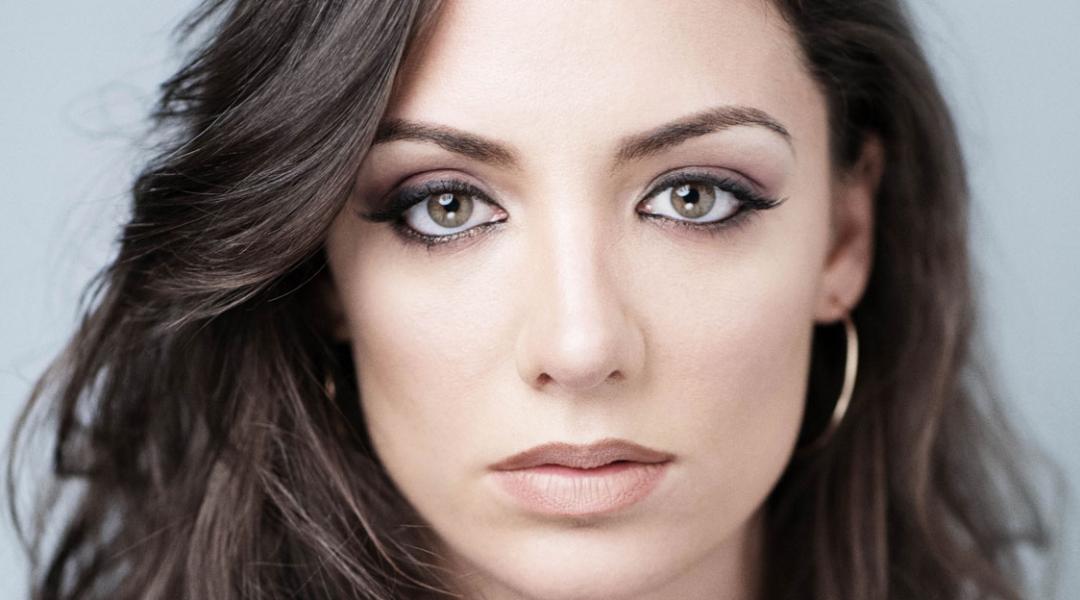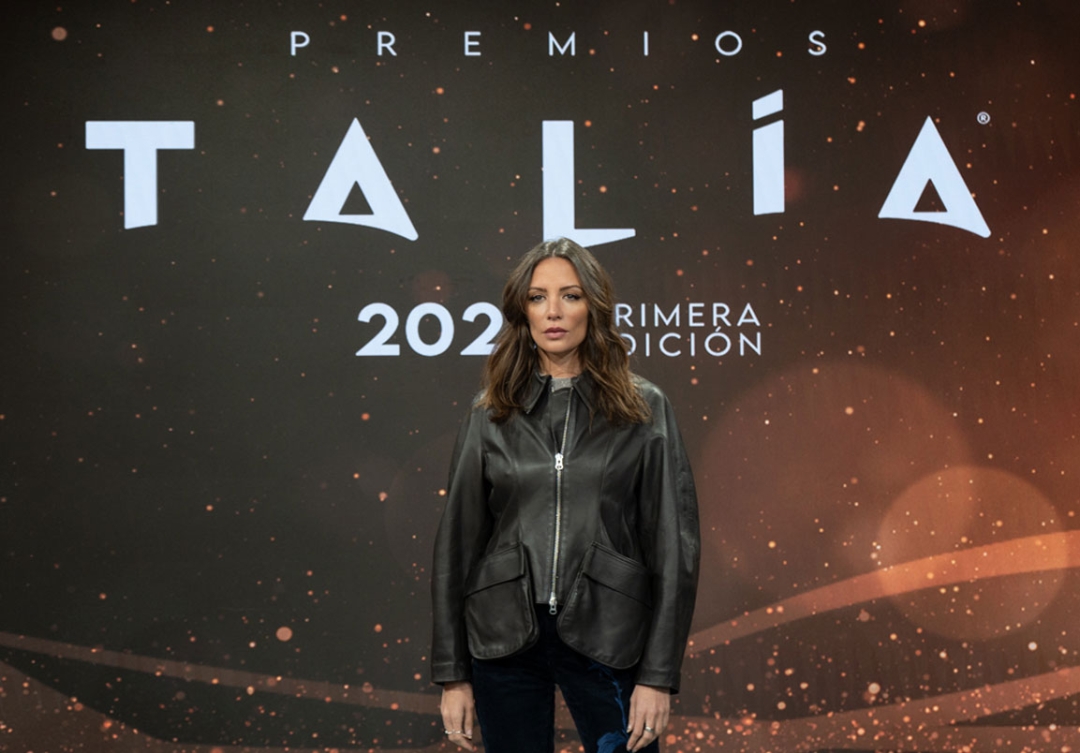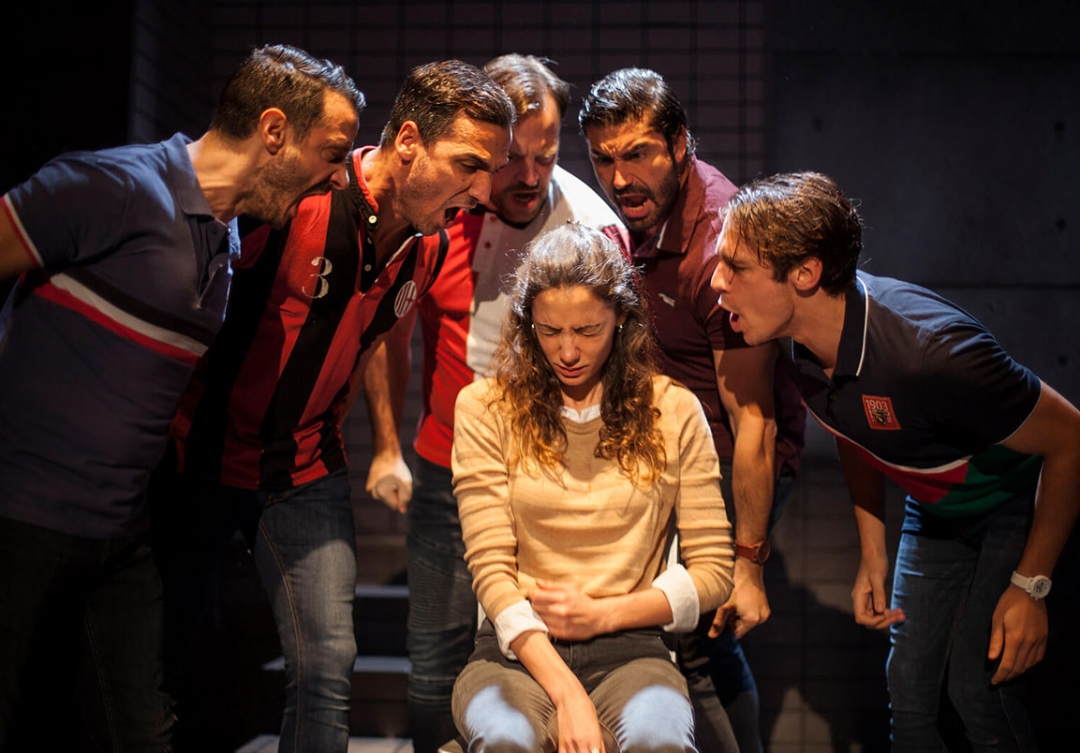María Hervás
A voice of her own

If you close your eyes and listen to her voice, her face appears in your mind. This is how charismatic María Hervás’ voice is, a brave, inquisitive and versatile actress who has found the roles that best suit her understanding of acting in the theatre —‘Iphigenia en Vallecas’, ‘Jauría’ or her latest work, and her first Lorca, ‘Yerma’—. Her commitment to the stage has earned her the Talía Award for Young Talent.
If María Hervás (Madrid, 1987) is known for something, it’s for her voice. The same voice that, as a child, she lent to puppets when her mother took her to the theatre, the place where her passion for acting was born and that she has a soft spot for. “It’s also where I’ve had the chance to play the best characters,” she admits. Although her voice is mostly associated to TV series, like the recent Alpha Males —currently shooting its second season—, it’s in the theatre where she’s received the most praise and recognition: 2019 Max Award for Iphigenia en Vallecas and 2020 Fotogramas de Plata 2020 for Jauría, both in the category of best actress. This is how, role after role, Hervás has associated her distinctive voice to attributes such as commitment, passion and talent. In return, the Spanish Academy of Performing Arts, has decided to grant her, alongside Sergio Bernal, the Talía Award for Young Talent —award sponsored by Iberia—.
Before talking about the present, let’s look back. Where did your passion for acting come from?
My mother used to take me to the theatre as a child. I remember being fascinated even by puppets and, while sitting in the dark, thinking: “I want to move the puppets and give them a voice.” I was good at understanding how characters felt.
“Onstage is where I feel my best as an actress, where I feel emotions more strongly”
You started studying Architecture, but you dropped out to pursue Performing Arts. What led you to that decision?
There was a time when I split my time between Architecture, Performing Arts and my first role on Los Serrano. I didn’t rest, so I started falling asleep during my Architecture lessons, but never in my Performing Arts classes. That was the best sign that I really wanted to be an actress. I was also lucky early on. I remember that phase as one of the most wonderful in my life.
And now, how do you feel when you step onstage? Is it a dream come true?
Absolutely. When I was young, while studying Performing Arts, I used to visualise my parents sitting in the dark at the María Guerrero Theatre, waiting for a performance I was in to start. Onstage is where I feel my best as an actress, where I feel emotions more strongly and the most direct connection with the audience.
If you had to choose one of your works onstage, which would it be and why?
That’s such a tricky question! Perhaps Confesiones a Alá. It was my first monologue, at the tender age of 25. When I received the call to audition, I panicked about not being close enough to the character’s conflict —a Berber shepherdess from the Atlas Mountains—, but in the end I found an accent, a way of moving and a particular gaze. That proved to me that I was ready to take on difficult and compromising challenges.
“I don’t get too comfortable and always try to step out of my comfort zone, delve into less predictable emotions and create multifaceted characters”
Is that role the most challenging you’ve faced as an actress?
I don’t get too comfortable and always try to step out of my comfort zone, delve into less predictable emotions and create multifaceted characters that always surprise the audience. Jauría was also a big challenge, because playing the victim of La Manada before the Supreme Court had even declared its ruling was really emotional.
Although you’ve received the most recognition from theatre, the public knows you best for your TV roles. Does it bother you a little?
Not really. Everyone has a TV at home, but not everybody takes the time to go to the theatre, so it’s normal that people know me more for my audiovisual work. I love when someone who knows me from TV discovers me onstage. The other day, for example, after doing Yerma, someone in the audience said: “I don’t know what this girl is doing on TV, she should never step offstage.”
“I love when someone who knows me from TV discovers me onstage”
Throughout your career you proven you are really versatile. They say it’s harder to do comedy than drama, what do you think?
I think it’s hard to do both things well. I don’t find comedy really hard because I understand timing well, it’s pure maths combined with being unashamed and able to laugh at yourself. If you can do it, there’s nothing more liberating than this.

María Hervás during the opening of the first edition of the Talía Awards. © Academia de las Artes Escénicas de España [Spanish Academy of Performing Arts]
Your latest work is Yerma. What is it about Lorca that makes his work more relevant than ever almost a century after his death?
Lorca was an intrepid sociologist. He understood human conflict really well, just like Shakespeare did, but with the fullness of Spanish poetry and charm.
Talent grows when it connects; who have you learnt the most from throughout your career?
I’m a big theatre fan and a film buff. I admire so many fellow actors and actresses that, if I started, I’d have to name them all. I’m like a child in that sense, I’m constantly learning and enjoy watching people a lot.
“A celebration like the Talía Awards is fuel to keep believing in your dreams”
The other day you were announced as one of the nominees to the Talía Awards. Does the performing arts industry need this kind of recognition?
It’s a tough job, with an unemployment rate of almost 90% and a lot of insecurity. People see the beautiful side of it, but there’s a huge lack of stability. A celebration like the Talía Awards is fuel to keep believing in your dreams.
Is theatre a commitment then?
For me, it is. Onstage you can’t fool the audience, they can see and hear everything. You either give it your all or people will zone out and you’ll be robbing them of the chance to experience an emotional journey.
“Onstage you can’t fool the audience, they can see and hear everything. You either give it your all or people will zone out”
And what do you think theatre is going through now?
I believe we’re hungry for live performances. During the pandemic, we consumed all the audiovisual content in the world and now we want to see real human beings doing things (laughs). Theatre is a communal reflective exercise. A ritual that allows us to get to know ourselves better as human beings through emotions, the most powerful tool I know.




